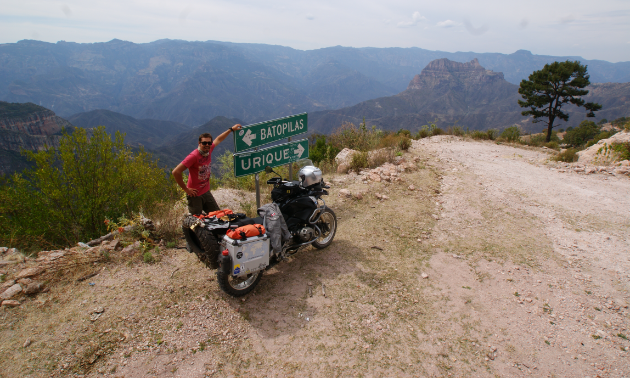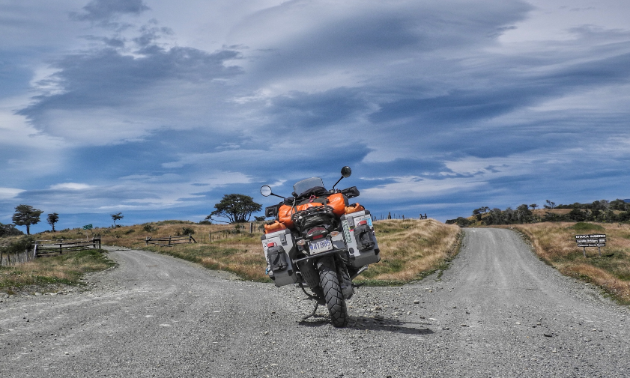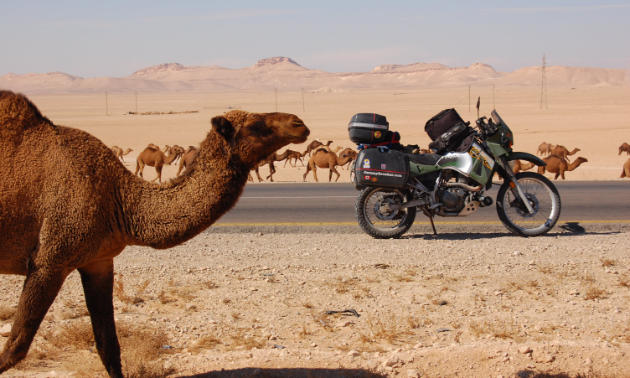Travelling the world on a motorcycle sounds like a grand adventure, and it is, according to two men who have taken the leap. Kevin Chow has already gone from Alaska to Argentina and has Australia next on his radar. Jeremy Kroeker has journeyed from Alberta to Panama and Germany to the Middle East during two separate trips that he chronicled in his two published books, including the Canadian-bestseller Motorcycle Therapy. Here’s their advice for preparing and enjoying life on the road—whether it is paved, dirt or something else entirely.
About how much should someone save for a worldwide voyage?
Kroeker: I travel frugally. From Alberta to Panama, it only cost $4,000 and I was gone for four months. It doesn’t take a whole lot of money when you think about it. If I’d stayed in Canada, I’d have spent $4,000 anyways on rent and food.
When I went to the Middle East, I was gone for 10 months and it cost me $12,000 total. It costs about $1,000 a month it seems. Save between $1,000 and $2,000 per month.
Chow: Depending on the country, you’re spending $20 to $50 bucks a day. In Chile and Argentina I spent up to $80 bucks a day just because of fuel costs down there. I think I average $40 to $45 a day. You can easily spend a lot more if you want a nice place to sleep and a lot better food in your belly.
I track my expenses on a spreadsheet. In Canada, you’re spending debit, not cash, so everything is recorded. You can go back and see how much you’ve spent online. When you’re on the road, you’re changing money, you’re using cash.
How much planning goes into a trip of this magnitude?
Kroeker: I typically do my trips impulsively. I just kind of go by the seat of my pants. For my trip to Germany and the Middle East, I had to plan out a few things as far as paperwork goes.
Chow: It took a lot of planning. For me, the big thing was savings.

Kevin Chow takes in the sights on the road between Batopilas and Urique, Mexico. — Photo courtesy Kevin Chow
As far as visas and governments go, which places are easiest to deal with? Which are the most challenging?
Kroeker: If you’re from North America, going south is the easiest thing you can do. You don’t need to gather paperwork or visas. You can just do that on the road.
Chow: They’re all pretty straightforward between here and Argentina.
What supplies and parts are necessary for a round-world trip?
Kroeker: I carry a spare clutch cable, fuses, chain, sprockets, bits and bobs—enough parts and supplies to fix flats on the side of the road. That’s another reason why I ride a Kawasaki KLR 650. They’re easy to fix.
Chow: As little as possible. When I left, I thought, ‘I’ll take a big tent, all the tools, four oil filters, my motorcycle boots, my gloves, my hiking boots, my running shoes, I have lots of clothes so if I’m sweaty I can put new clothes on.’ I had way too much stuff when I left. Because I ride off road, it’s too much weight on the motorcycle. I shed things three times on the trip. Now I have as little as I can. Wherever you go, you can borrow or rent things. I have one tool roll and a tiny Pelican case with sockets, just enough to get by. Having a BMW, you don’t really need a lot of tools, which is nice.
How many changes of clothes do you have and what’s the best way to maintain healthy hygiene when on dusty roads day after day?
Kroeker: I’ve got proper motorcycle pants and jacket and gloves. I compromise with the boots. I have leather hiking boots that would offer some protection in a crash and they’re also comfortable. I carry a couple pairs of pants and a few changes of underwear. To save money, I walk into the shower wearing all of my clothes. I will lather up, and as I am washing I remove items of clothing until all the clothes are clean and I finish my shower.
Chow: One. The pants that you see in the photos are the same ones I wear every day. I have a pair of thermal underwear and fleece pants (pajama-type pants), three pairs of underwear. I left with 10 T-shirts and now I’m down to three. I have one pair of motorcycle socks. I just wash them every second night. I don’t even have a pillow. I squeeze a sweater into the sleeve of my sweater, ha ha!
I’m kind of OCD about being clean. I wouldn’t let things get stinky. If I’m at a place with hot water and a shower, then I’m washing my clothes and hanging them at nighttime. It’s actually a lot easier to just do laundry every night with one set of clothes than packing a lot.
What’s a non-essential thing (keepsake, memento, gadget) that you have taken with you?
Kroeker: I bring an electronic reader, a Kindle.
Chow: My coffee cup and my coffee filter so I can make coffee in the morning.

Plan where you want to go—or don’t. The choice is yours. — Photo courtesy Kevin Chow
Where do you usually sleep?
Chow: It depends where I end up. I prefer to be camping in my tent because I sleep a lot better when it’s quiet. If I’m really tired and don’t have the energy and I need Wi-Fi and a shower, then I’m looking for a hotel or hostel. In hostels, you’re in a dorm room with other people and you need to put the ear plugs in. When I’m on a motorcycle all day long, I just need a quiet place.
What tips or bit of advice do you have for motorcyclists who would love to undertake this sort of trip?
Kroeker: I think the hardest part about taking a motorcycle journey is just getting moving. Some people get bogged down with research and planning. Not to say that’s not important, but some people go overboard with it and they never actually leave the house. Don’t be intimidated by a trip.
Chow: Just go. If I can figure it out, anybody can figure it out.
What has been the biggest challenge throughout your journey?
Kroeker: Travelling with people. Getting along with your travel partner can be challenging because you’re often stressed, tired and confused. You get a bit short-tempered with someone and they with you.
Choosing your travel partner wisely is important as well as being flexible and maybe even factoring in some breaks from your travel companion. Take some space and time for yourself and have your own adventures. Then come back fresh and new and carry on your journey.
Is there anything you wish you would’ve known when you started the trip that you know now?
Chow: No. I think part of leaving is learning, isn’t it? You learn as you go.
Any parting words of wisdom?
Kroeker: Carry travel insurance.








Comments